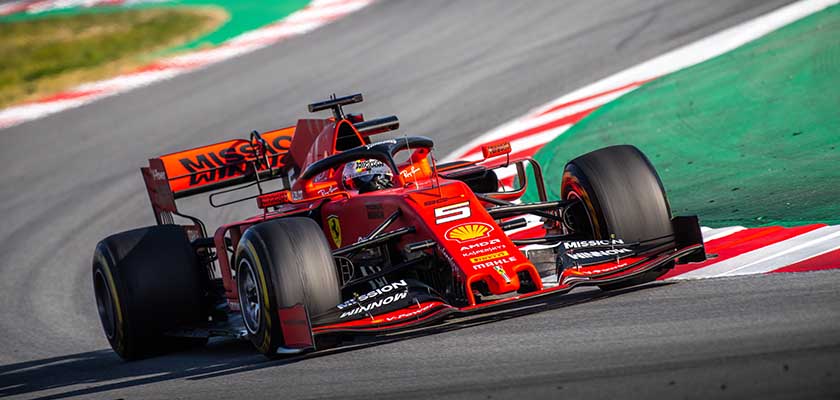Formula 1 is the most prestigious category in world motor racing, bringing together the best drivers, teams and circuits on the planet.
In this complete and up-to-date guide, we’ll explore the history, rules, greatest champions and curiosities of this sport that is worshipped by millions of fans.
You’ll also learn about the scoring system, classification criteria, penalties and the car manufacturers’ strategies.
Check it out 👇
What is Formula 1?
Formula 1 is the most important category in international motor racing, managed by the International Automobile Federation (FIA). The world championship involves teams and drivers competing in a series of races known as Grand Prix.
The GPs, as they are also known, are held on different types of tracks, including street circuits, racetracks and mixed circuits.
F1 cars are highly specialised, with advanced technology, refined aerodynamics and powerful engines. The teams are made up of famous car manufacturers such as Mercedes, Ferrari and McLaren.
Drivers compete for points in each race. The drivers’ and constructors’ world championships are decided over the course of a season that usually includes more than 20 races.
Formula 1 is known for its high speed, thrilling overtaking, complex racing strategies and huge audiences. It is one of the most watched and commercially successful sports in the world.
History of Formula 1
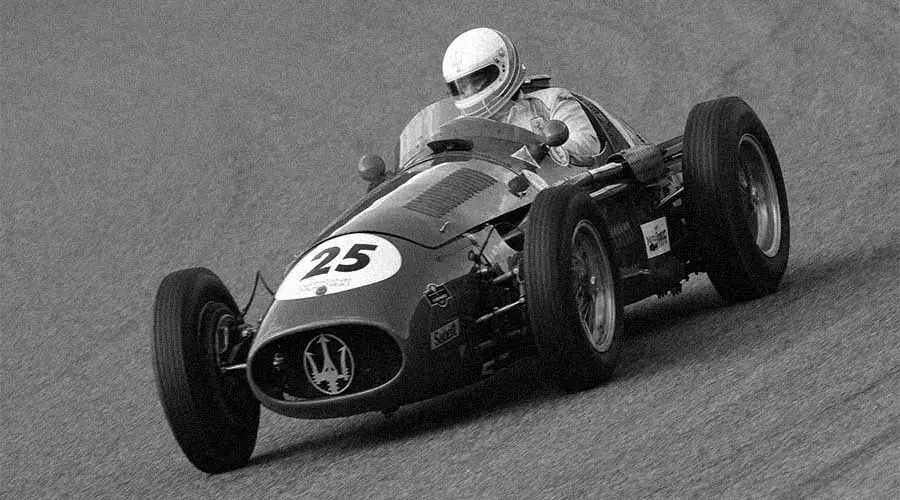
Formula 1 began in 1950, when the International Automobile Federation created the World Championship.
In that first season, Giuseppe Farina from Italy won the title of the first drivers’ world champion. Since then, the category has grown in popularity and become the most prestigious in world motorsport
Throughout the 1960s, the Ferrari team emerged as a powerhouse, with notable drivers such as Phil Hill and John Surtees. During this period, the cars began to undergo significant evolutions in terms of design and performance.
The 1970s saw the rise of drivers such as Emerson Fittipaldi and Niki Lauda. What’s more, Lauda survived a serious accident in 1976 and, surprisingly, returned to racing, demonstrating the resilience of Formula 1 competitors.
In the 1980s, the category witnessed an intense rivalry between Alain Prost and Ayrton Senna. This decade was also marked by technological advances, with the introduction of electronics in the cars, significantly altering the dynamics of the races.
The 1990s became known as the era of Michael Schumacher, who dominated the period, winning multiple titles for the Benetton team and later for Ferrari.
Today, Max Verstappen and Lewis Hamilton are the most skilful racers in the F1 World Championship.
Greatest Formula 1 champions in history
- Michael Schumacher – 7 titles
- Lewis Hamilton – 7 titles
- Juan Manuel Fangio – 5 titles
- Alain Prost – 4 titles
- Sebastian Vettel – 4 titles
- Jack Brabham – 3 titles
- Jackie Stewart – 3 titles
- Niki Lauda – 3 titles
- Nelson Piquet – 3 titles
- Ayrton Senna – 3 titles
- Max Verstappen – 3 titles
How does Formula 1 work?
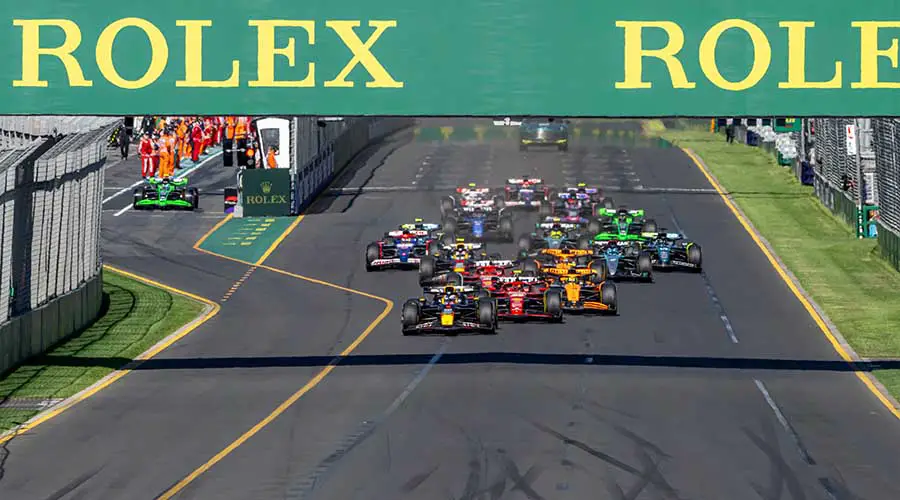
The Formula 1 World Championship is an annual competition made up of 24 races known as Grand Prix (GPs).
The calendar is diverse and covers tracks in numerous countries, from traditional racetracks to street circuits.
Each of the ten F1 teams has two drivers who compete in cars designed with the most advanced technologies on the market.
During the season, drivers accumulate points according to their position in each Grand Prix.
Before each race, there is a qualifying session that determines the starting order. The drivers compete in three stages (Q1, Q2 and Q3), with the fastest drivers progressing to the next stages.
The racer with the most points at the end of the calendar wins the World Championship title.
F1 is characterised by a constant search for technological innovation. Teams invest in research and development to improve the performance of their cars, covering areas such as aerodynamics, engines, electronic systems and racing strategies.
Driver transfers between teams and changes to the cars are common between seasons, adding a dynamic element to the tournament.
Formula 1 rules
In F1, there are strict rules and regulations that drivers, teams and everyone involved must follow to ensure safety, fairness and the smooth running of races. Some of the most important restrictions include:
- Unsporting driving | Behaviours considered unsporting, such as intentional collisions, excessive blocking and dangerous manoeuvres, are prohibited;
- Dangerous overtaking | Overtaking must be carried out safely and within the limits set by FIA rules;
- Flags and signals | Drivers are obliged to obey the flags and signals issued by the stewards. Ignoring these signals may result in penalties;
- Entering and exiting the pits | Entering or exiting the pits must be done safely and within the specified limits;
- Use of DRS | The Drag Reduction System can only be used in specific zones of the track when a driver is within one second of the car in front, and there are restrictions on when and how it can be activated;
- Track limits | Drivers must not exceed the track limits on a regular basis. If they do so to gain an advantage, they may be penalised.
Formula 1 scoring system
- 1st place: 25 points
- 2nd place: 18 points
- 3rd place: 15 points
- 4th place: 12 points
- 5th place: 10 points
- 6th place: 8 points
- 7th place: 6 points
- 8th place: 4 points
- 9th place: 2 points
- 10th place: 1 point
- Fastest lap: 1 point*
*An extra point is awarded to the driver who records the fastest lap of the race, provided they finish in the top ten.
Formula 1 teams in 2024
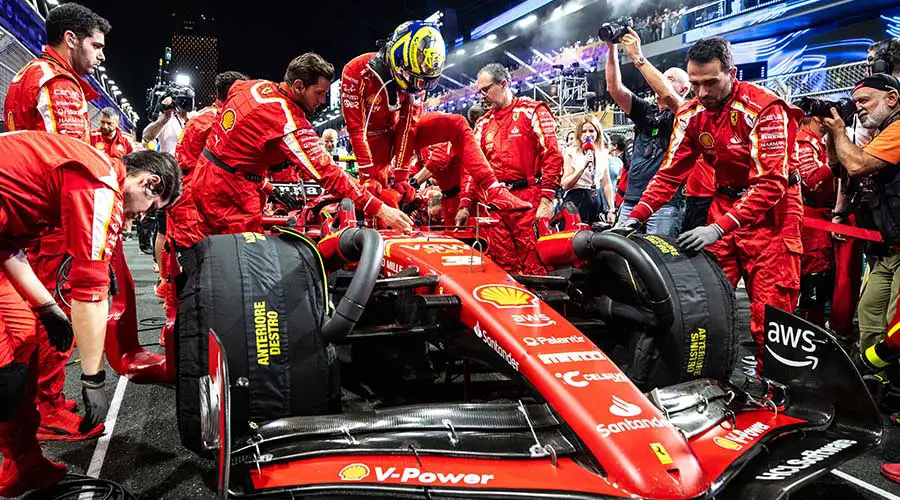
- BWT Alpine F1 Team – Alpine-Renault
- Aston Martin Aramco F1 Team – Aston Martin-Mercedes
- Scuderia Ferrari – Ferrari
- MoneyGram Haas F1 Team – Haas-Ferrari
- Stake F1 Team Kick Sauber – Kick Sauber-Ferrari
- McLaren F1 Team – McLaren-Mercedes
- Mercedes-AMG Petronas F1 Team – Mercedes
- Scuderia AlphaTauri RB – RB-Honda RBPT
- Oracle Red Bull Racing – Red Bull Racing-Honda RBPT
- Williams Racing – Williams-Mercedes
Formula 1 drivers in 2024
- Esteban Ocon – BWT Alpine F1 Team
- Pierre Gasly – BWT Alpine F1 Team
- Fernando Alonso – Aston Martin Aramco F1 Team
- Lance Stroll – Aston Martin Aramco F1 Team
- Charles Leclerc – Scuderia Ferrari
- Carlos Sainz Jr. – Scuderia Ferrari
- Kevin Magnussen – MoneyGram Haas F1 Team
- Nico Hülkenberg – MoneyGram Haas F1 Team
- Guanyu Zhou – Stake F1 Team Kick Sauber
- Valtteri Bottas – Stake F1 Team Kick Sauber
- Lando Norris – McLaren F1 Team
- Oscar Piastri – McLaren F1 Team
- Lewis Hamilton – Mercedes-AMG Petronas F1 Team
- George Russell – Mercedes-AMG Petronas F1 Team
- Daniel Ricciardo – Scuderia AlphaTauri RB
- Yuki Tsunoda – Scuderia AlphaTauri RB
- Sergio Pérez – Oracle Red Bull Racing
- Max Verstappen – Oracle Red Bull Racing
- Logan Sargeant – Williams Racing
- Alexander Albon – Williams Racing
Formula 1 circuits in 2024
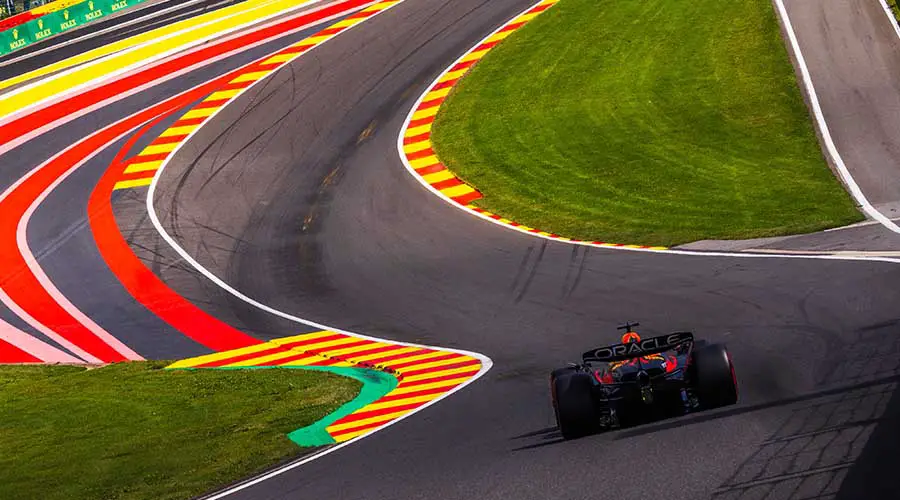
- Bahrain Grand Prix – Bahrain International Circuit (02/03)
- Saudi Arabian Grand Prix – Jeddah Corniche Circuit (09/03)
- Australian Grand Prix – Albert Park Circuit (24/03)
- Japanese Grand Prix – Suzuka Circuit (07/04)
- Chinese Grand Prix – Shanghai International Circuit (21/04)
- Miami Grand Prix – Miami International Autodrome (05/05)
- Emilia Romagna Grand Prix – Imola Circuit (19/05)
- Monaco Grand Prix – Monaco Circuit (26/05)
- Canadian Grand Prix – Gilles Villeneuve Circuit (09/06)
- Spanish Grand Prix – Barcelona-Catalunha Circuit (23/06)
- Austrian Grand Prix – Red Bull Ring (30/06)
- British Grand Prix – Silverstone Circuit (07/07)
- Hungarian Grand Prix – Hungaroring (21/07)
- Belgian Grand Prix – Spa-Francorchamps Circuit (28/07)
- Dutch Grand Prix – Zandvoort Circuit (25/08)
- Italian Grand Prix – Monza Circuit (01/09)
- Azerbaijan Grand Prix – Baku City Circuit (15/09)
- Singapore Grand Prix – Marina Bay Street Circuit (22/09)
- United States Grand Prix – Americas Circuit (20/10)
- Mexican Grand Prix – Hermanos Rodríguez Autodrome (27/10)
- São Paulo Grand Prix – Interlagos Autodrome (03/11)
- Las Vegas Grand Prix – Las Vegas Strip Circuit (23/11)
- Catar Grand Prix – Lusail International Circuit (01/12)
- Abu Dhabi Grand Prix – Yas Marina Circuit (08/12)
Now you know all about Formula 1 and are ready to follow the World Championship in 2024! In the meantime, don’t forget to visit our website often, see? We publish fresh articles every day 👊


